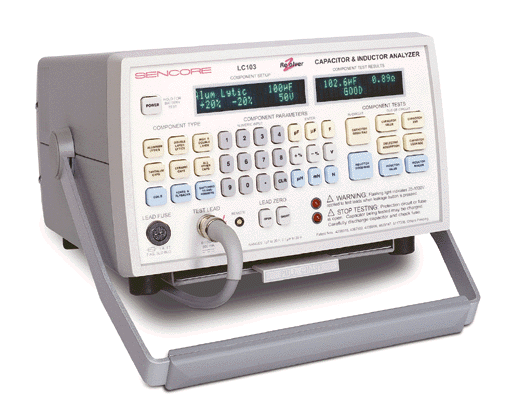What Is ESR Meter And Why Every Repairer Must Have One For Testing Electrolytic Capacitors
Testing electrolytic capacitor on board with Capanalyser 88A ESR Meter
All electronic repairers must have esr meter on their repair bench because this special ‘gem’ really can help you to test, troubleshoot and repair electronic equipment faster especially testing electrolytic capacitors on board or in-circuit. Before I explain in details about how good this tester is, why not understand the meaning of ESR first. All capacitors have a certain amount of resistance to the passage of AC current, the ESR which stands for Equivalent Series Resistance is the total of all internal resistances of a capacitor measured in Ohms.
An ideal capacitor has 0 ohms ESR. The bottom diagram showed a resistor in series with a “perfect capacitor”. The value of this resistor is called ESR. It is a must for technicians to check electrolytic capacitors with esr meter otherwise they might not be able to find the caused of the problem.
If you have any electronic equipment that over the years has degraded in its performance such as no power, a newly replaced components burnt after running for sometimes then chances are good that one or more electrolytic capacitors inside the equipment has failed, causing the problem. Electrolytic capacitors ESR ohms value could increase due to drying or corrosion in its material.
Capacitor with high ESR ohms value is a frequent problem in today’s electronic circuit. In certain circuit (especially dealing with frequency), even a slight increased in ESR value can cause the whole equipment to stop working and causing intermittent problems as well. Usually a good electrolytic capacitor (depending on the microfarad ) have a low ESR value, which stays that way for many years unless the rubber seal is faulty (due to heat or excessive voltage), in which case the electrolyte’s component gradually dries out and the ESR value will rise up with time.
As mentioned above, when the capacitor ages, the ESR value will increase and it often does so in such a dramatic way that the equipment completely stop functioning or even blows up any components that directly connected to it. It's also very common to find capacitors that the esr value have increased so much of their normal resistance, yet the capacitance value remains the same!
You may ask why should I use esr meter? Because checking electrolytic capacitors with an analogue or digital capacitance meter can MISLEAD an electronic repairer into believing that a faulty capacitor is good. This will surely waste your faultfinding time because they could not locate the culprit! If you don’t measure the ESR value of a capacitor, you will always miss the bad capacitor! Normally, these bad capacitors have high ESR reading which your normal meter or digital capacitance tester can’t test it.
By the way, do you know that ESR meters can perform other wonders besides checking the ESR of a capacitor? Some designed of ESR meter have the capabilities to:
Test low ohms resistor such as 0.1 ohm, 0.27 ohm and so forth.
Measure horizontal output transistor (HOT) in a Monitor or Television – Just like testing a HOT on board with an analog meter, if an open-circuit reading is obtained, the short-circuit is elsewhere. If the short-circuit remains, the transistor is defective.
Fault finding short-circuit in the track, usually will trace to the bad components - You can utilize the ESR meter to locate short-circuits on electronic boards by checking the actual track resistance. One probe connects to the ground and the other to the circuit line and if the measurement rises as you probe further along the track, you know that you are heading to the wrong direction! If the esr value decreases as you move along the track then you are in the right direction.
Check the condition of both the normal and rechargeable batteries – A worn out, flat and defective batteries will usually have high ESR value. Compare with a known good one and you will easily differentiate a good from the bad batteries.
Although in the market currently selling lots of brand of ESR meter such as bob parker dick smith esr meter, EDS Capanalyser 88A, Tenma, B& K precision, Sencore and many more, I suggest that you get one according to your own budget. If you diligently surf the internet for technical homepage and website, you will find some interesting free esr meter schematic where you can build one for yourself.
Sencore LC103 Capacitor & Inductor Analyzer
|
|
Copyright@ 2006-2014-www.ElectronicRepairGuide.com All Rights Reserved
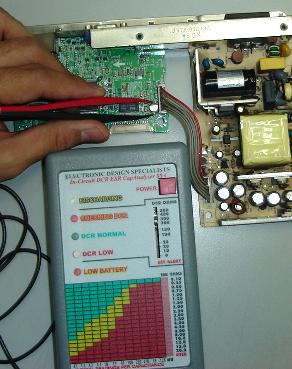

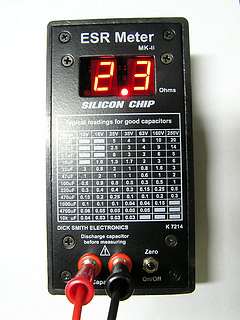 The rise in ESR value increases both voltage drops within the capacitor and the heat, produced in the capacitors due to resistive
heating. If you don’t test electrolytic cap for ESR, you may not be able to solve the problem. A high ESR value is the first indicator of
capacitor’s failure.
The rise in ESR value increases both voltage drops within the capacitor and the heat, produced in the capacitors due to resistive
heating. If you don’t test electrolytic cap for ESR, you may not be able to solve the problem. A high ESR value is the first indicator of
capacitor’s failure.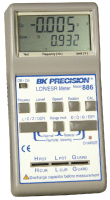 Only by using the ESR tester, you will be able to test the ESR on capacitors and you will not be fooled by capacitors with bad
ESR (high ESR value). Another good news is that the ESR meter can even test capacitor on board, which means you don’t need to remove the
capacitor from circuit board in order to test it with a normal capacitor meter. Even if you get a good reading testing the capacitance value
with a digital capacitance meter, if the ESR value out, the capacitor is still considered bad!
Only by using the ESR tester, you will be able to test the ESR on capacitors and you will not be fooled by capacitors with bad
ESR (high ESR value). Another good news is that the ESR meter can even test capacitor on board, which means you don’t need to remove the
capacitor from circuit board in order to test it with a normal capacitor meter. Even if you get a good reading testing the capacitance value
with a digital capacitance meter, if the ESR value out, the capacitor is still considered bad!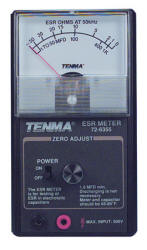 Check horizontal yoke coil winding of a cathode ray tube, inductors and primary winding of a power transformer – If a shorted
turn is detected, the inductance drops dramatically and the esr meter will indicate ohms
Check horizontal yoke coil winding of a cathode ray tube, inductors and primary winding of a power transformer – If a shorted
turn is detected, the inductance drops dramatically and the esr meter will indicate ohms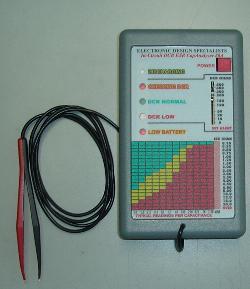 Test speakers, amplifier and other equipment - The pulses generated by the meter have a fast rise and fall time, so it would
probably make a crude RF signal injector as well.
Test speakers, amplifier and other equipment - The pulses generated by the meter have a fast rise and fall time, so it would
probably make a crude RF signal injector as well.